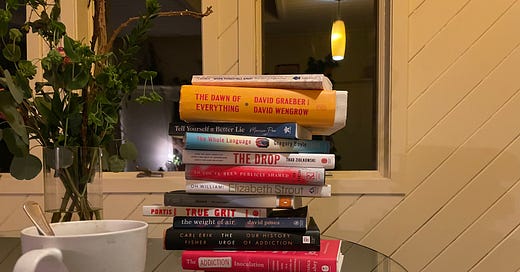I read a lot of books.
More than most people, and that’s because it’s a huge priority for me. That being said, remember as you’re reading this that I like books more than dating, sex, working out, watching TV, cooking food, knitting, nature walks, or cat videos; and just slightly less than playing cards with my mom, traveling to Italy, standing in line to buy an oat milk latte that I cannot figure out how to make at home, going to dinner with friends, and clumsy attempts at gardening. Meaning, if this feels like a lot of fucking books, that’s only because reading is important to me the way laying in bed with your kids or creating your own fabrics or collecting rocks might be to you (it’s also my job). I make an exceptional amount of space for it and I spend more money on books some months than I do on groceries. If you ever look at my reading list and think you aren’t reading enough, perhaps instead think, “she’s definitely out of clean underwear” and know that’s a true assumption.
Mos…




